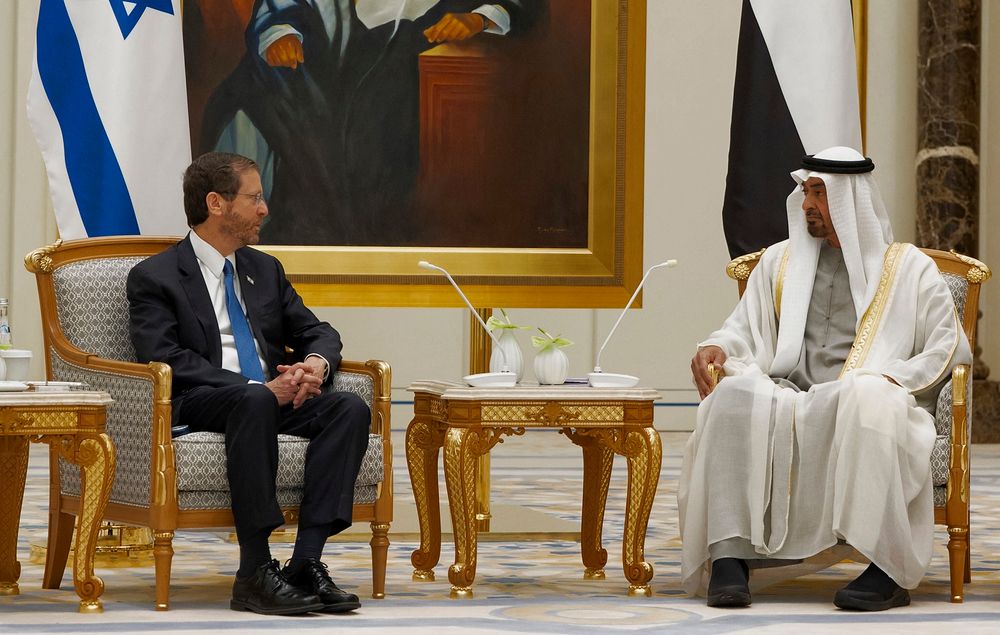Alwaght- The Israeli President Issac Herzog arrived in Abu Dhabi on Saturday on an official visit to the UAE and was received by the Emirati Foreign Minister Abdullah bin Zayed Al Nahyan. The trip is important in political and timing terms. In political terms, this is the first-ever visit by an Israeli president to the UAE. The crossing of his plane from Saudi Arabian airspace makes the issue even of extreme significance.
In terms of timing, the visit coincides with the new round of Yemeni striking attacks deep into the UAE.
Here is a question: Can Herzog visit provide a way of out of the risks to its security?
Israeli empty promises: from bilateral cooperation to Yemen war
After August 13, 2020, when the Israeli-Emirati normalization was given official publicity, the two sides announced increase in trade, security, energy, and technology cooperation. One of the most important aspects of Herzog trip has to do with the Emirati plan to draw Israeli support in the face of missile and drone strikes by Yemeni National Salvation Government (NSG) in response to Arab coalition's crimes in various parts of Yemen.
Reports suggest that the has focused specifically on the issue of Ansarullah Movement's recent attacks on the UAE. On the one hand, the UAE seeks to attract the political and military support of the Israeli regime to counter Ansarullah's attacks, and on the other hand, the Tel Aviv political apparatus and media explicitly call the figuregead president's visit sending a message of support to the UAE in the war against Yemen.
According to media reports, Mohammed bin Zayed, the Crown Prince of Abu Dhabi, during his meeting with Herzog, in addition to bilateral cooperation, raised security cooperation necessity. During the meeting, media reported, the Israeli president, condemning Ansarullah's recent attacks on Yemen, made it clear Tel Aviv condemns any attack targeting the sovereignty and security of the UAE. He also supported the Emirates efforts to protect itself against Ansarullah retaliation.
Israeli hoodwinking of the Emirates
The remarks and the content of the Israeli president's meetings with Emirati officials concerning bilateral cooperation and support for Abu Dhabi in the face of Ansarullah attacks have raised two important questions. Can the Emirati rulers now take a gesture of reaping the rewards of normalization by attracting the political support of the Israeli regime? And how much can they hope for the real support of Tel Aviv in the face of attacks of NSG army?
It must be taken into account that so far, contrary to the propaganda presented by the Israeli and Arab media, the normalization has been only in the interests of Tel Aviv and presented no special achievement for the Emirati side. In other words, while the Israelis are constantly harvesting the fruits of the thaw, it is the Emiratis who pay the price of the deal.
So far, the Israeli-Emirati relations have been a zero-sum game in favor of Tel Aviv. The Israelis are extremely pleased to see the Emirati-Yemeni tensions escalating as they find any inter-Muslim tensions providing them with an opportunity to broaden their influence in the region, bury the Palestinian cause from the Muslim nations, and break geopolitical isolation they have been since foundation of Israel in 1948.
This means that the Emirati rulers, setting hope on Tel Aviv providing them with anti-missile batteries, are simply living a chimera. Just contrary to the Emirati thought, the Israeli security institutions have denied the possibility of supplying Abu Dhabi with the high-tech Iron Dome missile interceptors, proving the UAE definitely a loser in the so-called peace deal.
Yet another blowback for the UAE in addition to emptiness of the promises and privileges of normalization to Abu Dhabi, which included delivery of F-35 stealth fighter jets and backing against Yemen missile strikes, is the wave of pessimism in the Arab world about joining the normalization process. Not only other normalizing states — Bahrain and Morocco, and Sudan — have not enjoyed normalization rewards but also Saudi Arabia, which initially was considered to be the keen next normalizer, is now extremely reluctant to normalize.



























